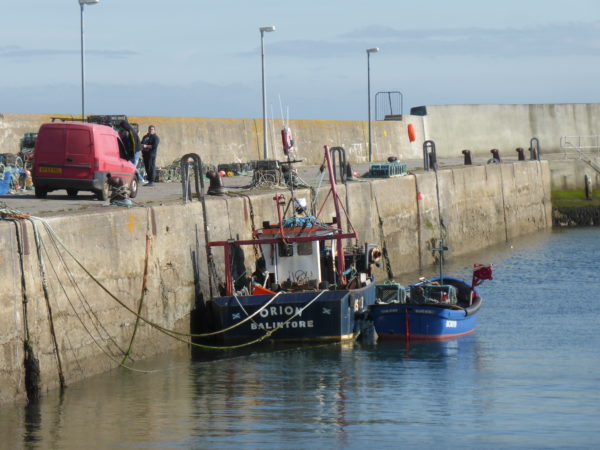
Seaboard fish
First of all, a huge thank you to everyone who has given me their Seaboard words and phrases since my appeal last month. The response has been amazing, especially at the Fisherfolk Festival dinner, and while I was on duty in the Fishing Store. There are far too many names to mention everyone, and lots of words came in anonymously, or I didn’t get everyone’s names, but the longest lists (so far!) came from Hugh Skinner, Anne Barclay, Jean Mackenzie, and (to my delight) the table of young people at the dinner: Tore, Jamie,Peter, Stina, Julie, Keith. So special thanks to them, and hope that will urge others to come up with more! 😊
It will take me quite a while to sort them all out, try to figure out the Gaelic spellings and look them up in my various sources, and record them more systematically. I’ll also combine them with my own memories and copious notes taken from my late mother Hansy and Katie Ross and others over the years. But I thought I should get a few into this Fisherfolk Festival edition of the Seaboard News, so here’s a selection of fish for you!
Do get back to me if you have other local words and phrases (on any subject), past or present, and of course to comment on this batch, or add to it. Hand in anything to the Hall for me (spelling it just as you would say it).
Further selections to follow in the future.
Everyone’s favourite fish name – the mourcan (Gaelic murcan, pron. moorcan), a lumpfish or lumpsucker. The female mourcan (“even uglier”!) seems to have been called a paddle. This word was also used in Fife, according to the Scots Dictionary, so presumably a Scots term, not Gaelic.
The juntack or jintack – all agreed it’s a spiny fish that lurks in the sand in the shallows (Don’t step on any jintacks! my mother used to warn us), but various suggestions for what it is in English, incl. angler-fish, monkfish and weever fish. From Gaelic dionntag (pron. juntack), meaning both stinging nettle and lesser weever, but it may be used differently here.
Sellack – tiddler, very small shoreline fish. Probably from sgiolag, sgiollag – pron. skiollak, skullag – small fish, minnow, also sand-eel.
Sooyan – saithe (saoidhean, 2 – 3 year old saithe)
Pelaig, paillac – porpoise (peileag, pron. pay-lak – porpoise)
Porstan – small crab G. portan, partan pron. porstan, parstan – (green) shore crab. From port, pron. porst, with -an, a diminutive ending: “a wee port creature”.
Spog / spawg – crab claw. G. spòg – claw. A small claw was a spògan.
Plashack – “a good fluke with spots”; plaice. No Gaelic word like that found for any flat fish, though I know the word well myself for a plaice. Plaiseadh (pron plash-ugh) = splashing – maybe it splashed about if disturbed? OR it’s a Gaelicisation of the word plaice, with a diminutive ending (-ag) – “a plaicie”.
Gealach – “a bad fluke”. Again, not found in this context. Gealach (gyallach) = anything white or whitish (geal=white), but also the moon. Were they pale / spotless, moonlike, or did they turn that way when caught? There is a word gealag (gyallak), found in my 1828 dictionary, meaning a white trout or salmon trout, but that’s not the same thing.
Leopach – flounder (Hilton and Balintore, not Shandwick?) – leòbag , lyoh-pak – any flat fish, esp. flounder or sole
Garvie – sprat, small herring. G. garbhag pron. garra-vak – small herring (also plaice, spotted flounder, but seemingly not in the Villages)
Sannel – sand-eel (Scots)
Trollachan, troilleachan – squid (Bruce), or catfish, anglerfish (others) Gaelic stròilleachan, squid – we must have lost the S locally. My mother said her impression of it as a child was that it was an unspecified sea-creature you didn’t want to meet – the fishermen weren’t keen on it. Maybe no sales or use for squid back then?
Eskan, aiskeen – conger eel G. easgann, pron. eskan or ayskan – eel
Gimmach –lobster G. giomach – pron. gimmach
“Coo-ee-chack” – whiting G. cuiteag
Cat-a-chreig – catfish (literally “rock cat”)
Kerapan – basking shark. G. cearban (kyer-a-pan) or carban (kar-a-pan)
Strangely enough, no words for salmon, herring or haddock came up (though I didn’t ask specifically, as so many words were coming in). The most common Gaelic for those is bradan, sgadan and adag. Any of these familiar? Or alternatives? I recall sgadan from my childhood. Haddock, as far as I recall, was just haddie. Salmon was just “a fish” – never named. “Have you got a bittie fish for me?” Superstition? Diplomacy?
The salmon fishing was canerack: “When you starting the canerack?” G. càinearachd, pron. kaan-er-ochk, from càinear, a salmon-fisher – seems to be a Ross-shire word (also W. Ross). Cainreach pron. kaneroch, is a small trout, but the words for trout and salmon are often interchanged regionally.
I’ll leave you with one of my main sources, Dwelly’s dictionary (1911), on the sooyan:
saoidhean

-ein, -an, sm The coalfish, saithe (pollachius virens). Named according to its age as follows:—1st year, Sìol or sìolagan.2nd year, Cudaig, cudainn or saoidhean.3rd year, Smalag, cuideanach or saoidhean.4th year, Saoidhean or piocach.5th year, Saoidhean-dubh or saoidhean-mór.6th year, Ucsa or ugsa. [1st year, Cudaig; 2nd year, Smalag; 3rd year, Saoidhean; 4th year, Saoidhean-mór; after 4th year, Ucas — Lewis, (DMy)]. Bu mhath a’ chudaig far nach faighte an saoidhean, the cuddy is good when no saithe can be got. The young saithe is called cuddy in some parts of Scotland and podly in others. It is sillock in Shetland. Raasay people are nicknamed “na saoitheanan.”
https://www.faclair.com/ViewDictionaryEntry.aspx?ID=CBAFE1E75E7B40AF66F0A2F36397724C